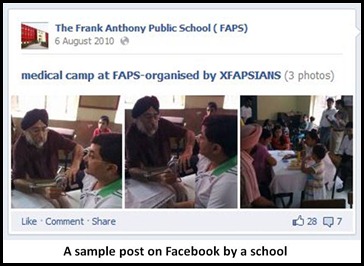 The use of social media in primary education has been debated over a lot by the likes of social media experts, teachers and parents in recent years. While traditionalists say that allowing children to access social networks in schools would distract them from the very purpose of discipline and education, some argue that there are unseen and unfelt benefits of the same for students which outweigh the risks.
The use of social media in primary education has been debated over a lot by the likes of social media experts, teachers and parents in recent years. While traditionalists say that allowing children to access social networks in schools would distract them from the very purpose of discipline and education, some argue that there are unseen and unfelt benefits of the same for students which outweigh the risks.
We think, if used with care, established social media platforms could be leveraged to build schools reputation and can also, on a microscopic basis, provide a sound education to students through involvement of teachers and parents. Of course it goes without saying that all the activities that a student undertakes on the social platform is under a teacher/parent’s able guidance.
A new book
It is surprising that a platform as popular as Facebook has yet not been an active provider in the education sector. What is more surprising is the fact that there are host of features that a student can capitalize to broaden their knowledge base or simply assist them in the process of learning.
For instance, a class can be divided into groups based on interests, subjects, extra-curricular activities etc. and students could be provided with access to Facebook groups under the teacher’s guidance at school and the parents at home. The groups could turn out to be quite an ideal platform to share assignments, homework, ideas and learning within the members. It can also be used as a collaborative platform for project work and assignments.
Also, features such as notes can be used to come up with feature writing on a particular topic. Teachers can use the page to:
-
Upload questions
-
Do polls
-
Use photos to educate
-
Quizzes
-
Notes
On a broader level, a school can run its own page. This would be a more universal display of talent and activities happening in a school. Not just that, the Facebook page can be used innovatively to live stream events/lectures etc. to a whole set of audience anywhere in the world. This would give collaborative learning a whole new meaning. Schools can work together on global projects. World history, for example, would become so much more fun if students of a country would explain their country’s past to a logged in global audience.
 Also, the page could be a true notice board for parents. If used properly and correctly, the page could be a source of information for parents to regularly log back to see the calendar of events of a school. Pinning important events and notice to the page can help them communicate the news effectively.
Also, the page could be a true notice board for parents. If used properly and correctly, the page could be a source of information for parents to regularly log back to see the calendar of events of a school. Pinning important events and notice to the page can help them communicate the news effectively.
One opportunity lies in the Discussions tab on the Facebook Page. A school can create a discussion about a specific topic and allow members of the community to share their thoughts within the thread. Page admins can engage with parents to understand their concerns and help the school address those concerns.
Bringing education to life
Information that involves more senses is known to be absorbed in a whole lot better than that which involves just one. It is always easier for students to learn new things if they see and hear things at the same time.
 This is where a platform like YouTube can come in very handy. Not a lot of people know that YouTube has a dedicated YouTube for school service. YouTube for Schools gives you access to the hundreds of thousands of educational videos on YouTube EDU. This includes short lessons from top teachers around the world, full courses from the world’s best universities, professional development from fellow educators, and inspiring videos from thought leaders.
This is where a platform like YouTube can come in very handy. Not a lot of people know that YouTube has a dedicated YouTube for school service. YouTube for Schools gives you access to the hundreds of thousands of educational videos on YouTube EDU. This includes short lessons from top teachers around the world, full courses from the world’s best universities, professional development from fellow educators, and inspiring videos from thought leaders.
Teachers can log in and watch any video, but students cannot log in and can only watch YouTube EDU videos and videos their school has added on their school channel. All comments and related videos are disabled and search is limited to YouTube EDU videos.
Teachers can now use YouTube videos to:
-
Enrich classroom lessons
-
Spark a conversation
-
Make theory come to life
-
Tap into the mind of the visual learner
The universal encyclopedia
The biggest collaborative knowledge pool that is out there on the internet, Wikipedia, is a constant source of updated information. Teachers along with students can jointly set up internal wikis where they can add, edit, create and develop a learning theme.
Furthermore, incentivizing it with shares, likes, comments on other platforms only gives a boost to a student’s moral. Needless to say, when learning can be this fun, more students would be actively engaged in learning and sharing knowledge.
Answering the inquisitive minds
The question and answer platform, Quora, serves as a repository and knowledge pool that’s there on the internet. It is strictly a place for those who need accurate answers to questions related to a specific subject. Could it appeal to the students in schools? It mostly definitely will, we add.
 Students can create boards on the basis of a group of batch mates with similar interest areas after inviting them to the forum. After this it is pretty much creating a ready pool of discussions, problems, solutions in most of the recognised streams.
Students can create boards on the basis of a group of batch mates with similar interest areas after inviting them to the forum. After this it is pretty much creating a ready pool of discussions, problems, solutions in most of the recognised streams.
The summary section lets an individual collate the important points from all the posted answer and write one perfect answer that can be used by students. It is almost like a collaborative construction of an answer to a question.
A lot of schools in India have already started using these platforms. MIT Vishwashanti Gurukul, Rajbaug, Pune is a good example of such a start. We would love to see more such initiatives. After all, of what use is technology if not used for the enrichment of the mind?
What do you think about usage of social media in schools? Do you think this could be a sound platform for improved education system? Share your views with us. We would love to hear from you.

